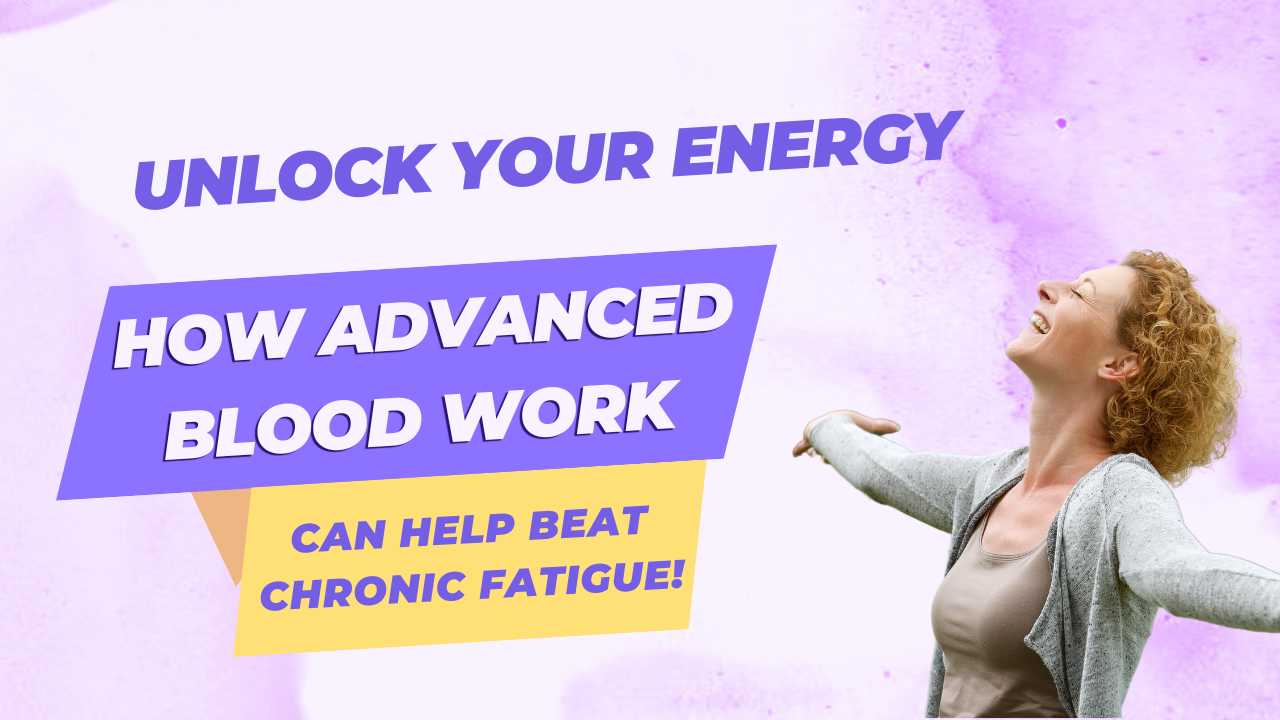Unlock Your Energy: How Advanced Blood Work and IV Therapy Can Help Beat Chronic Fatigue
Are you always tired, no matter how much rest you get? You’re not alone. Many women face the relentless grip of chronic fatigue, a condition that goes beyond ordinary tiredness and can significantly impact daily life.
In this article, we’ll explore common causes of low energy, the importance of lifestyle changes, and the crucial role of advanced blood work in uncovering underlying issues when these changes don’t bring relief.
Understanding Chronic Fatigue and Low Energy
Chronic fatigue is more than just feeling tired. It’s a complex condition characterized by extreme fatigue that doesn’t improve with rest and can worsen with physical or mental activity.
Women are often more susceptible due to factors like hormonal fluctuations, stress, and societal roles.
Practical Tips to Combat Fatigue
Managing chronic fatigue often starts with lifestyle adjustments. Here are some practical tips to help you regain your energy and improve your quality of life.
Lifestyle Adjustments
Balanced Diet – focusing on micro (think vitamins, minerals, amino acids and antioxidants) and macro nutrients (think protein, carbohydrates and healthy fats). *Important for cellular function which is key to understanding WHY we must focus on how we are fueling our body’s.
Fueling your body with the right nutrients can make a significant difference in your energy levels. Aim to:
Eat a variety of whole foods, including fruits, vegetables, lean proteins, and whole grains.
Stay hydrated by drinking plenty of water throughout the day.
Avoid processed foods, sugar, and caffeine, which can lead to energy crashes (These are mitochondria disruptors, meaning sugar, processed foods and coffee for slow caffeine metabolizers, disrupts cellular function).
Consider incorporating energy-boosting foods like leafy greens, nuts and seeds, and lean proteins.
Regular Exercise and Movement
Exercise might seem counterintuitive when you’re feeling fatigued, but regular, gentle exercise and movement can improve energy levels and overall well-being. Start with activities like walking, yoga, and stretching. Even focused breathwork is movement.
The key is to start slow and gradually increase the intensity and duration of your exercise routine.
Sleep Hygiene
Quality sleep is essential for managing fatigue. Here are some tips to improve your sleep hygiene:
Maintain a regular sleep schedule.
Create a relaxing bedtime routine.
Limit screen time before bed.
Optimize your sleep environment. *often it’s cooler temperatures that help with sleep
Stress Management
Stress can worsen fatigue, so it’s important to incorporate stress-reducing techniques into your daily routine. Some effective methods include mindfulness meditation, deep breathing exercises, and progressive muscle relaxation.
When Lifestyle Changes Aren’t Enough: The Importance of Advanced Blood Work
While lifestyle changes can make a significant difference, they might not be enough for everyone. If you’re still experiencing chronic fatigue despite your best efforts, it’s crucial to explore all potential underlying causes.
Advanced blood work panels can reveal imbalances or deficiencies that might be contributing to your fatigue and guide your healthcare provider in developing a more targeted treatment plan.
Advanced Blood Work Panels
Here are some key areas that advanced blood work can investigate:
1. Nutrient Deficiencies
Vitamin D Levels: Low levels of vitamin D are common and can contribute to fatigue and muscle weakness. A blood test can determine if supplementation is needed.
B Vitamins: Deficiencies in B vitamins, particularly B12 and B6, can lead to significant fatigue.
Iron Levels (Ferritin, Iron and iron binding capacity): Anemia, caused by low iron levels, is a well-known cause of fatigue. Checking for ferritin (your storage of iron), as well as iron, total iron binding capacity, transferrin saturation, and hemoglobin levels can reveal if iron deficiency is a factor.
Blood tests can assess these levels and help guide appropriate supplementation.
2. Thyroid Function
Thyroid Hormones: Hypothyroidism, or an underactive thyroid, can cause fatigue, weight gain, and depression. Testing for thyroid-stimulating hormone (TSH), Free T3, and Free T4 levels can diagnose thyroid dysfunction.
In some cases it is also important to assess thyroid antibodies and reverse T3.
3. Adrenal Function
Cortisol Levels: Chronic stress can lead to adrenal fatigue, characterized by abnormal cortisol levels. A cortisol test can help determine if your adrenal glands are functioning properly. We often test first morning cortisol and educate about optimal morning cortisol vs. evening cortisol for a full understanding of your cortisol rhythms.
4. Inflammatory Markers
C-Reactive Protein (CRP) and Erythrocyte Sedimentation Rate (ESR): High levels of these markers can indicate acute and chronic inflammation, which can contribute to fatigue. Identifying and addressing sources of inflammation can improve energy levels. These markers are often overlooked (ie. not included) on routine bloodwork.
5. Hormonal Imbalances
Sex Hormones: Imbalances in estrogen, progesterone, DHEA and free testosterone can affect energy levels and overall well-being. Hormone testing can identify these imbalances and help tailor hormone therapy if necessary.
6. Blood Sugar Levels
Glucose and Fasting Insulin Levels: Dysregulated blood sugar levels can lead to energy crashes and persistent fatigue. Testing can identify insulin resistance or diabetes, which can then be managed through diet, lifestyle changes, or medication.
7. Infections and Immune Function
Chronic Infections: Undiagnosed infections, such as Epstein-Barr virus (EBV) or Lyme disease, can cause chronic fatigue. Blood tests can detect these infections and guide appropriate treatment.
8. Comprehensive Metabolic Panel
Liver and Kidney Function: Ensuring your liver and kidneys are functioning properly is essential, as these organs play a crucial role in detoxification and energy production. A comprehensive metabolic panel can assess their health.
Steps to Take
Consult Your Healthcare Provider:
Discuss your symptoms and concerns. Express your interest in comprehensive blood work to uncover potential underlying causes of your fatigue.
Get a Referral: Your healthcare provider may refer you to a specialist, such as an endocrinologist or a functional medicine practitioner, who can order and interpret these tests.
Review Results Together: Once you have your results, review them with your healthcare provider. Understanding what the results mean and how they relate to your symptoms is crucial for developing an effective treatment plan.
Follow Up: Based on the findings, your provider might suggest specific treatments, lifestyle changes, or further testing. Regular follow-ups are important to monitor progress and adjust the treatment plan as needed.

Customized IV Vitamin Therapy
In addition to lifestyle changes and targeted treatments based on blood work results, customized IV Vitamin Therapy can be a powerful tool in managing low energy and chronic fatigue. Here’s how it works:
What is IV Vitamin Therapy?
IV Vitamin Therapy involves the administration of vitamins and minerals directly into the bloodstream through an intravenous (IV) drip. This method allows for higher concentrations of nutrients to be delivered directly to your cells, bypassing the digestive system, which can sometimes limit absorption.
Benefits of Customized IV Vitamin Therapy
Tailored to Your Needs: Based on your blood work results, an IV therapy regimen can be customized to address specific deficiencies and imbalances. This personalized approach ensures you receive the exact nutrients your body needs to function optimally.
Improved Absorption: By delivering nutrients directly into the bloodstream, IV therapy ensures maximum absorption, which can be particularly beneficial for individuals with digestive issues that impede nutrient uptake.
Immediate Effects: Many people experience an immediate boost in energy levels and overall well-being after an IV therapy session. This is because the nutrients are quickly available to your body’s cells.
Supports Overall Health: In addition to combating fatigue, IV therapy can support your immune system, enhance mental clarity, and improve your overall sense of wellness.
Common Components of IV Vitamin Therapy for Fatigue
Vitamin C: An antioxidant that supports the immune system and enhances energy production.
B Vitamins: Essential for energy metabolism and reducing fatigue.
Magnesium: Helps relax muscles, reduce stress, and improve sleep.
Amino Acids: Building blocks of proteins that support muscle repair and energy production.
B5 – Vitamin B5 is essential for producing energy from food in the form of ATP. It plays a role in the metabolism of carbohydrates, fats and proteins, which provide us with energy.
B6 – Vitamin B6 is a cofactor in several pathways in our bodies, meaning we use it for a variety of functions. It plays a role in energy production by supporting the production of ATP.
Carnitine – Carnitine works as a shuttle where it transports fatty acids into the mitochondria (the part of the cell where we house our energy) for cellular respiration. It helps metabolize ketones and convert amino acids into energy for our bodies.
Amino Acids – Branched-chain amino acids are essential nutrients that our muscles break down to supply our bodies with energy. We require adequate levels of amino acids to provide our tissues with energy.
NAC – By replenishing glutathione levels in the body, N-acetyl-cysteine supports the antioxidant pathway which helps clear oxidants from the body. When oxidants are built up, they can cause fatigue as a symptom.
Glutathione – Glutathione is our master antioxidant that helps clear free radicals (oxidants) from the body. Similar to the function of NAC, glutathione neutralizes oxidants which results in more energy available to our cells.
Don’t let chronic fatigue control your life. By making small, manageable changes and seeking professional help when needed, including advanced blood work and customized IV Vitamin Therapy, you can reclaim your energy and improve your quality of life. Remember, it’s important to listen to your body, seek professional help when necessary, and stay positive. Start today, and take the first step towards a more vibrant, energized you.
Next For You?
Ready to take control of your energy levels and combat chronic fatigue? Click here and book a free discovery call with one of our naturopathic doctors today.
During your consultation, we’ll discuss your symptoms, review your health history, and explore personalized solutions, including advanced blood work and IV Vitamin Therapy, to help you feel your best. Don’t wait—reclaim your vitality and live the life you deserve.
References:
Nutrient Therapy for the Improvement of Fatigue Symptoms:
This comprehensive review of 60 studies highlights the efficacy of various nutrient therapies, including vitamins C and D, L-carnitine, and CoQ10, in managing fatigue symptoms. The review underscores the positive impact of nutrient therapy on fatigue, particularly through intravenous (IV) administration, which ensures better absorption and efficacy compared to oral supplementation (MDPI).
Feasibility of Vitamin C in the Treatment of Post Viral Fatigue with Focus on Long COVID:
This systematic review evaluated the effects of high-dose IV vitamin C on fatigue resulting from various conditions, including long COVID. The findings showed that IV vitamin C significantly reduced fatigue scores and alleviated symptoms like sleep disturbances, lack of concentration, depression, and pain, demonstrating its potential as an effective treatment for chronic fatigue (MDPI).
How Nutrient IV Therapy Can Help Combat Chronic Fatigue Syndrome:
This article discusses the benefits of IV nutrient therapy, including the administration of essential vitamins, minerals, and amino acids directly into the bloodstream. It highlights the role of NAD (nicotinamide adenine dinucleotide) in boosting cellular energy levels and reducing oxidative stress, which are critical factors in managing chronic fatigue syndrome (Atlas Health Medical Group).
Vitamin C Therapy May Help Epstein-Barr Virus:
A clinical study on the effects of IV vitamin C therapy on Epstein-Barr virus (EBV), often associated with chronic fatigue, showed that patients receiving IV vitamin C had significantly lower levels of EBV antibodies and experienced improvements in fatigue symptoms. This study supports the use of IV vitamin C in managing chronic fatigue linked to viral infections (University Health News).




